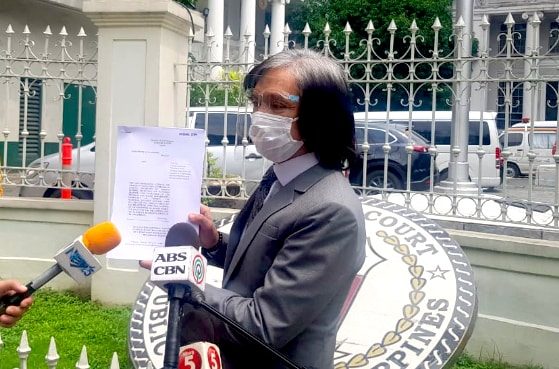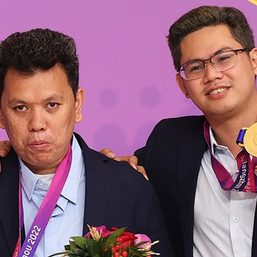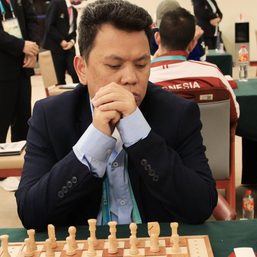SUMMARY
This is AI generated summarization, which may have errors. For context, always refer to the full article.

MANILA, Philippines – Lawyer Rudolf Jurado, President Rodrigo Duterte’s former government corporate counsel (GCC), filed on Wednesday, July 8, the 5th petition before the Supreme Court asking to void the administration’s anti-terror law.
Jurado’s 62-page petition attacks the supposed unconstitutionality of the rush to pass the bill at the House of Representatives.
Based on Rappler’s information as of Wednesday, there are at least 7 more groups to file their respective petitions; many of them have opted to wait for the law to take effect within 15 days of publication.
The Supreme Court en banc, in its session on Tuesday, July 7, asked the government respondents to submit their comments to the first 4 petitions within 10 calendar days from notice. The en banc also consolidated the first 4 petitions.
Railroad of the bill
The lower chamber passed the bill on 2nd reading on June 2, and then on 3rd reading on June 3.
Jurado said this violates Section 26(2), Article VI of the Constitution which requires printed copies of the bill to be distributed to members 3 days before its passage.
No bill passed by either House shall become a law unless it has passed three readings on separate days, and printed copies thereof in its final form have been distributed to its Members three days before its passage, except when the President certifies to the necessity of its immediate enactment to meet a public calamity or emergency. Upon the last reading of a bill, no amendment thereto shall be allowed, and the vote thereon shall be taken immediately thereafter, and the yeas and nays entered in the Journal.
Because the bill hurdled 2nd and 3rd reading in 2 consecutive days, that rule was not followed, said Jurado, depriving all members to fully discern the legalities of the provisions of a bill which they would vote for.
Jurado cited lawmakers who withdrew their votes, such as Muntinlupa Representative Ruffy Biazon who was supposed to be a co-author but had his name struck off as co-author and voted no.
Biazon said they were not allowed to make amendments.
The House version adopted the Senate version in full, meaning it did not have to go through the bicameral committee for more deliberations and reconciliation of two versions. It went straight to Malacañang for Duterte’s signature. (READ: House of terror: How the lower chamber let slip a ‘killer’ bill)
“In fact, the Members were extremely misinformed that not one of them was able to realize (before voting) how the Senate ambiguously defined a certain act of terrorism,” said Jurado’s petition.
Section 26(2), Article VI of the Constitution allows the Congress to be exempted from those rules if Duterte certifies the bill as urgent, which he did, but Jurado said even that did not meet the constitutional standard of there being a public calamity or emergency.
“Since the Presidential Certification does not even mention the words ‘public calamity’ or ’emergency,’ as it was issued merely to address an urgent need to strengthen the law on anti-terrorism,’ it is only logical to conclude that no public calamity or emergency exists at least insofar as the amendments to the Human Security Act of 2007 is concerned,” said Jurado.
Jurado added: “All of these are telling proofs that the House of Representatives acted with grave abuse of discretion amounting to lack or excess of jurisdiction when it passed House Bill No. 6875 without complying with the three (3) day mandatory period imposed by Section 26(2), Article VI, of the 1987 Constitution.”
Section 29
Like the previous 4 petitions, Jurado also attacked the constitutionality of Section 29 of the anti-terror law, which authorizes the anti-terror council to order the arrest and detention of suspects without warrants.
Previous petitions say this usurps the power of courts. (READ: EXPLAINER: Comparing dangers in old law and anti-terror bill)
Jurado focused on the part of the provisions which exempts law enforcement from criminal liability should there be delay in bringing suspects to court.
Jurado said this violates Article 125 of the Revised Penal Code which imposes criminal liability on law enforcement who fail to bring suspects to court within prescribed periods – 12 hours, 18 hours, or 36 hours depending on the offense.
Suspects can sometimes waive the application of Article 125 on them, especially if they want to be able to exhaust all their remedies at the prosecutorial level.
Jurado questioned why the law would waive Article 125 on the suspect’s behalf.
“For indeed, it is elementary that only the person who enjoys the right can waive the same, as it would be perilous if someone can waive the rights of another without the latter’s consent,” said Jurado.
In the Constitution, if martial law is declared, the prescribed period to bring a suspect to court is extended to 3 days.
In the anti-terror law, it’s as long as 24 days. – Rappler.com
Add a comment
How does this make you feel?





There are no comments yet. Add your comment to start the conversation.